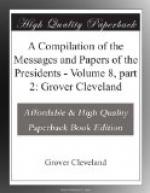Under this section it is obvious that no additional banks will hereafter be organized, except possibly in a few cities or localities where the prevailing rates of interest in ordinary business are extremely low. No new banks can be organized and no increase of the capital of existing banks can be obtained except by the purchase and deposit of 3 per cent bonds. No other bonds of the United States can be used for the purpose. The one thousand millions of other bonds recently issued by the United States, and bearing a higher rate of interest than 3 per cent, and therefore a better security for the bill holder, can not after the 1st of July next be received as security for bank circulation. This is a radical change in the banking law. It takes from the banks the right they have heretofore had under the law to purchase and deposit as security for their circulation any of the bonds issued by the United States, and deprives the bill holder of the best security which the banks are able to give by requiring them to deposit bonds having the least value of any bonds issued by the Government.
The average rate of taxation of capital employed in banking is more than double the rate of taxation upon capital employed in other legitimate business. Under these circumstances, to amend the banking law so as to deprive the banks of the privilege of securing their notes by the most valuable bonds issued by the Government will, it is believed, in a large part of the country, be a practical prohibition of the organization of new banks and prevent the existing banks from enlarging their capital. The national banking system, if continued at all, will be a monopoly in the hands of those already engaged in it, who may purchase the Government bonds bearing a more favorable rate of interest than the 3 per cent bonds prior to next July.
To prevent the further organization of banks is to put in jeopardy the whole system, by taking from it that feature which makes it, as it now is, a banking system free upon the same terms to all who wish to engage in it. Even the existing banks will be in danger of being driven from business by the additional disadvantages to which they will be subjected by this bill. In short, I can not but regard the fifth section of the bill as a step in the direction of the destruction of the national banking system.
Our country, after a long period of business depression, has just entered upon a career of unexampled prosperity.




